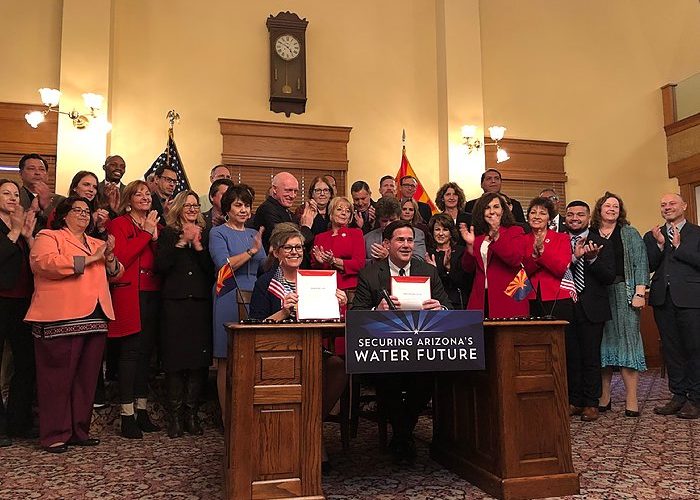Governor Doug Ducey and state lawmakers swept in with hours to spare Thursday to sign off on a long-awaited landmark agreement to shore up Lake Mead and secure water supplies for Arizona’s booming central corridor.
Both state houses almost unanimously approved the joint resolution – 88 for and 1 against – before handing it to the governor, who signed it just hours before a midnight deadline.
In doing so, the state avoided a federal takeover of the process.
Arizona receives nearly 40 percent of its water from the Colorado River. Without the plan, Arizona could have lost 17 percent of that allocation, Gov. Ducey said in a tweet.
“The Drought Contingency Plan is the most significant water legislation passed in nearly 40 years – and it was done by putting party labels aside and putting Arizona first,” Ducey said. “But make no mistake: today marks an important step, but not the last step, needed to protect our water supply. As Arizona transitions to a drier future, we must continue to promote a culture of conservation – one that enables the unbeatable quality of life and boundless opportunity we enjoy.”
The legislation is Arizona’s piece of a pact with six other states, Mexico, and the federal government that details how states will build up water levels in Lake Powell and Lake Mead, the storage “tanks” for the Colorado River. The river is becoming irretrievably parched under a 19-year-drought. Arizona’s first ever water shortage is more than 50 percent likely next year.
The Lower Basin Drought Contingency Plan (DCP) is designed to protect Lake Mead from dipping dangerously low and to reduce the risk of harmful water cuts to low priority water users like inland farmers in Pinal County. The newly crafted DCP, however, is only an intervention to carry Arizona through to 2026. Then a new DCP must be negotiated.
Under warning from the federal Bureau of Reclamation, a statewide steering committee of 38 water stakeholders across Arizona worked feverishly for six months to get the agreement in place in time for January legislative session.
Cities, tribes, farmers, home builders, water districts and other water users have agreed to share, sell or conserve water as part of the pact. The committee co-chairs are Arizona Water Resources Department Director Tom Buschatzke and Central Arizona Project General Manager Ted Cooke.
State lawmakers gave sweeping approval to a joint resolution to move the plan forward. The Senate voted 29-1. The House, 59-0.
“Today’s passage of the Drought Contingency Plan is the result of years of negotiation and collaboration,” said House Speaker Rusty Bowers, a member of the steering committee. “Nobody got everything they wanted but our state will be in a much stronger position moving forward. I’m grateful to my colleagues, Governor Ducey, and other stakeholders for setting aside partisan differences and parochial interests to reach a compromise on this deal.”
House Minority Leader Charlene Fernandez said the legislature showed its mettle this week, proving it is a body of “statesmen and stateswomen” who can set aside political differences to guard Arizona’s water legacy.
“It is not perfect. It is a stop gap. It is a compromise,” Fernandez said during the House vote. “No one believes it is an answer to a long-term water shortage but it is a beginning. No matter how smart it is, we have to be smarter.”
Senate President Karen Fann said, “We know nothing is perfect but this is a pretty darn good move forward on water policy.”
Federal Bureau of Reclamation Commissioner Brenda Burman was pleased with the state for finally completing the task.
“With this huge step forward, we are more optimistic than ever that all seven Colorado River Basin States will put a plan in place to protect the Basin this year. Today represents an important day for all Arizonans – they should be proud of their water leaders,” Burman said.
A wide range of businesses and organizations also acknowledged the effort.
“Arizona’s business community cannot overstate how important adoption of the Drought Contingency Plan is for our state’s future,” said Glenn Hamer, CEO and president of the Arizona Chamber of Commerce and Industry, who praised Gov. Ducey for his public and vocal insistence that the steering committee and legislature protect Lake Mead at all costs.
“Arizona has sent a message loud and clear that the state will have the resources necessary to thrive in the years to come and that our state’s leaders are willing partners in future multistate water stewardship negotiations. This is a once-in-a-generation accomplishment and it takes its place alongside the 1980 Groundwater Management Act in significance.”
Adoption of the DCP was identified as the Chamber’s top priority for 2019. Earlier this week, the Arizona Chamber of Commerce and Industry helped lead a coalition of over 60 members of the business community who lent their name to a statement of support for the DCP’s passage.
The agreement cements the state’s ability to sustain economic growth for years to come, Hamer said. Now, Arizona is well positioned for future water negotiations with other Colorado River states.
Courtney McKinstry who analyzes water issues for the Arizona Chamber Foundation said Gov. Ducey and legislature’s actions Thursday prevent a potential hornets’ nest of conflicts and legal complications.
“Controlling Arizona’s response to the drought in collaboration with our six western state neighbors rather than leaving it in the hands of the courts or federal agencies allows all Arizonans to plan for the future and provides businesses the stability they need to continue to invest in Arizona’s thriving economy,” McKinstry said.
On Thursday, the governor signed two bills that enabled Arizona to ratify the DCP:
- Authorization for the Department of Water Resources Director Buschatzke to sign onto the interstate DCP on behalf of Arizona.
- Agreements between certain water stakeholders on water usage rights, $30 million for Lake Mead conservation, $2 million for groundwater conservation, and $9 million for Pinal County infrastructure for pumping groundwater.
The governor’s signature also was required in order for the Gila River Indian Tribe to move forward a deal that allows home builders to purchase water from the tribe to replenish groundwater supplies in central Arizona. The $97.5 million, 25-year-agreement ensures water supplies for decades to come, with or without a shortage.
Ducey also issued an Executive Order creating the Water Augmentation, Innovation, and Conservation Council. Comprised of legislative leadership, the director of the Arizona Department of Water Resources and other appointees. It will recommend opportunities for long-term water conservation.
Congressional action is now required to implement the federal components of the DCP.
“Arizona’s water leaders have done their job, now it’s time for Congress to do its job,” Hamer said. “The Chamber will be working with the state’s congressional delegation and the administration to ensure that all facets of the DCP are secured.”
Throughout the DCP process, the Foundation, the Chamber’s research arm, produced analyses on Arizona water policy and the DCP, sharing its researchers’ findings with lawmakers in order to facilitate a greater understanding of the issue’s complexities. The Foundation’s water policy briefs are available on its website.
This morning, the Department of the Interior issued a Federal Register Notice seeking recommendations for potential actions in the event that the Drought Contingency Plan is not executed. This is due to other Lower Basin stakeholders not adopting the DCP by the January 31st deadline. Bureau of Reclamation Commissioner Brenda Burman issued a statement applauding Arizona’s success in completing the necessary legislation and that she is optimistic that the Basin States will complete their work.
The comment period begins March 4, 2019 and will be open for 15 days.
For more information on the DCP, visit the ADWR website.
















Add comment